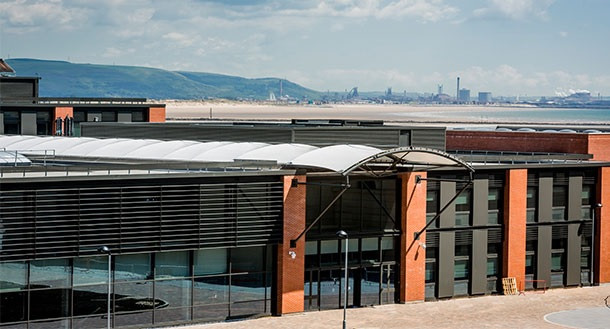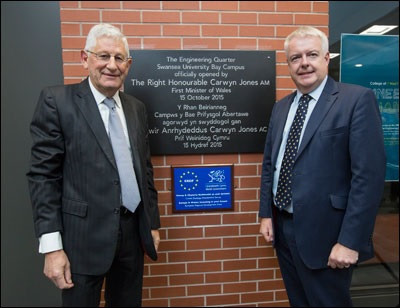Swansea rebellion: How university transformed by EU money was left stunned by Brexit vote
More than £150m was invested in Swansea by the EU before voters turned off the taps.

Swansea University's Bay Campus still smells new even though the £450m ($600m, €538m) facility opened its doors to students in September. Glass doors rebound perfect reflections, handrails are polished and smooth and grass is still growing in recreational spaces.
State-of-the-art buildings at the 65-acre site symbolise the modernity and ambition of the university in stark contrast to the depressing situation at Tata steelworks in nearby Port Talbot, which wheezes carbon dioxide into the air 12 miles east.
Once a flagging institution, the university has been transformed into a Top 50 university in The Times' Good University Guide 2015 and a Top 10 university for quality of life in the Lloyds TSB University Quality of Life survey. The Engineering department is ranked 10th in the UK.
This about turn came thanks to investment by the European Union. "It has been phenomenal," vice chancellor professor Richard B Davies told IBTimes UK.
"The EU has been key in powering us forward in the last 15 years from a university that had fallen behind the pace to one that was named by The Times newspaper as one of high quality. We would not have got there without significant funding from the EU.
Read more about the Swansea rebellion
How a community lavished with EU funds turned its back on Europe
'I'm not racist but...' How immigration concerns swayed the Swansea Brexit rebellion
"The funding has been used primarily on infrastructure. You have seen the buildings but then there is also the advanced equipment. We probably have the best equipped engineering school in Europe."

Through the European Investment Bank and European Regional Development funds, the EU has either invested or loaned more than £150m at the Uni. Last month the university announced a £60m cash injection to redevelop its Singleton Park Campus and to expand research facilities.
But the flow of money coming from the EU looks set to dry up after 51.5% of Swansea voted Leave at last week's referendum. As Westminster descended into chaos, a sombre atmosphere was cast over the University with entire departments taking long lunches the day the results came in.
"I was absolutely stunned and we have no explanation for it," Davies added. "The people I meet here every day, the people at the university, the people we work with, 90% of the students, the academics – they all voted Remain.

"We can only speculate what happened. Maybe there was disillusionment, maybe people lost confidence in the government. We have also got to look at the main media. The main media has put out very negative stories about the EU. It is difficult to get big positive stories out there. You probably get more stories about straight cucumbers."
The Leave campaign – led by Boris Johnson and Michael Gove – claimed £350m a week extra could be spent on the NHS if the UK left the EU and Davies believes that message may have resonated with voters in Swansea.
"Some conversations I have had mentioned how the people felt the message that came out of the Brexit camp was that there would be more money if we did not give it to the EU. There were specific promises made about regional development funds. We will be reminding them about their promises.
"It is a lot less of a blow than what it would have been five years ago. The fact that we are starved of one source of income is not so critical. We are already scoping for different models. There will be challenges but there will be opportunities."
As the university looks to tap new sources of investment, Davies said the result created a divide between the young, who overwhelmingly wanted to remain in the EU, and old, who wanted out to leave.
"There is a huge divide. The mood amongst the students is that they have been let down by the elderly who do not realise the damage they have done. That will take healing. There is a bitterness across universities at what has happened. One third of out staff come from outside of the UK. Now they feel unloved."
© Copyright IBTimes 2025. All rights reserved.






















